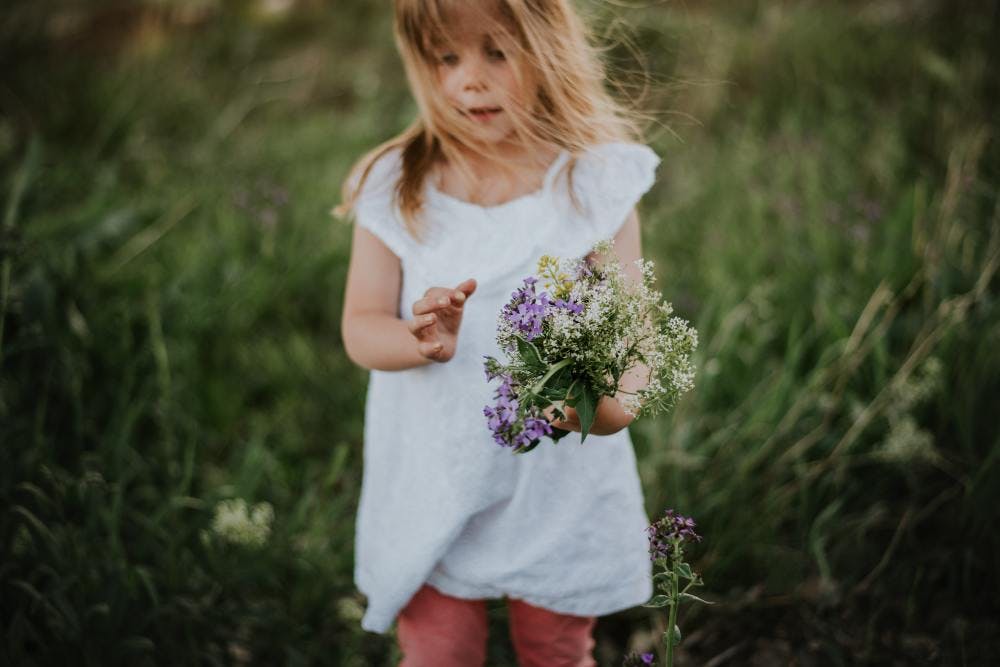Flower Name Meanings Hold Secrets
Flower name meanings have an obvious side — the lovely blooms the names represent — but many flower names have secret meanings too.
Before they took off as names, flowers were used as an intricate form of communication known, quite grandly, as floriography.
If a Victorian lady received flowers, she would automatically consult her floriography handbooks and dictionaries (which helpfully attributed meanings and phrases to a variety of flowers) to see what messages were being conveyed.
A white rose meant “I am worthy of you”, a Carolina rose meant “dangerous love”, while a full rose placed over two buds meant “secrecy”.
Some handbooks were more widely used than others and, although there were generally many similarities between the definitions, in some cases the flower name meanings diverged. It was clearly important that a courting couple were reading from the same flower dictionary as it could have meant the difference between a kiss and a slap.
Secret Meanings of Flower Names
While courting couples may no longer shyly exchange secret messages via bouquets and tussy-mussies, parents considering flower names for their babies may want to investigate the hidden meanings of their favorite blooms.
These meanings could tie into family values, like Bluebell (constancy) or red Clover (hard work). Or, they could honor a departed friend or family member, through meanings like "remembrance" (Rosemary), or "thoughts of absent friends" (Zinnia).
Below is a list of plant-names with their floriographic meaning attributed. I have used several Victorian floriography handbooks as a source and opted for the most frequently attributed meaning when there have been inconsistencies.
Acacia — friendship, elegance (pink/white), secret love (yellow)
Amaranth — immortality
Amaryllis — splendid beauty, pride
Ambrosia — love returned
Angelica — inspiration
Aster — variety
Azalea — temperance
Bay — glory
Belladonna — silence
Betony — surprise
Bluebell — constancy
Calla lily — magnificent beauty
Camellia — unpretending excellence
Carnation — fascination, refusal
Celandine — joys to come
Cherry blossom — good education
Clematis — mental beauty
Clover — industrious (red), think of me (white)
Coronella — success
Dahlia — dignity, elegance
Daisy — innocence
Fern — fascination
Fuchsia — taste
Hazel — reconciliation
Holly — foresight
Honeysuckle — generous, devoted affection
Hyacinth — sport, games, play
Iris — message
Ivy — friendship, fidelity
Jasmine — amiability
Jonquil — returned affection
Juniper — support, protection
Justicia — perfect beauty
Laurel — glory, ambition
Lavender — devotion, distrust
Lilac — youthful innocence (white), first love (purple)
Lily — purity, majesty
Lotus — eloquence
Magnolia — love of nature
Marigold — grief
Marjoram — blushes
Mignonette — your qualities surpass your charms
Mimosa — sensitivity
Mistletoe — surmounting all difficulties
Myrtle — love
Olive — peace
Pansy — you are in my thoughts
Peony — bashfulness
Poppy — consolation, extravagance
Primrose — early youth
Rose — love
Rosebud — pure and lovely (red), girlhood (white)
Rosemary — remembrance
Sage — esteem
Snowdrop — hope
Tansy — I declare war against you
Tulip — fame
Violet — modesty
Zephyr lily — expectation
Zinnia — thoughts of absent friends


